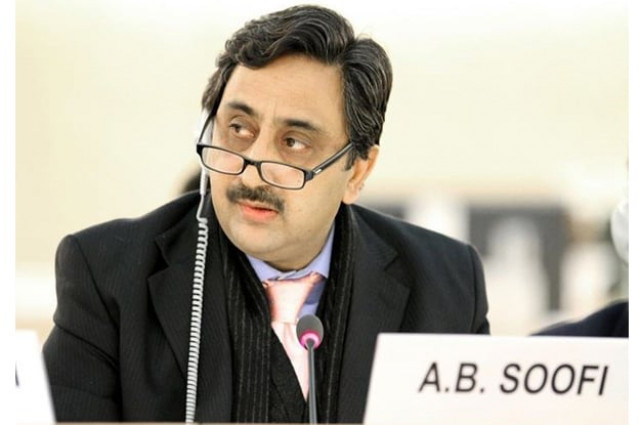Soofi sees historic opportunity for Pakistan
International law expert proposes incentive route instead of prosecuting and stigmatising everyone

International law expert Ahmer Bilal Soofi. PHOTO: RSILPAK.ORG
Soofi sees the disclosure of names through these leaks as a starting point for a global movement to curtail jurisdiction of offshore entities. “Pakistan can use this movement as an opportunity to stabilise its economy by offering incentives to its nationals and foreign entrepreneurs to invest their money in the country,” Soofi said in an exclusive interview with The Express Tribune.
He said after the scandal the UN convention against corruption enacted in 2003, might be strengthened further. The global outcry will lead to another movement where mandate of offshore jurisdictions will get curtailed, he said.
Panama leaks inquiry: PM must quit, go to jail, if proven guilty, says Imran
“What I see from all this is, I won’t be surprised if in the next few weeks or months there is some sort of a global legal framework evolved to curtain the jurisdiction of offshore companies. This is almost the same (situation) as we had seen in the global movement on anti-corruption,” he said.
Recalling his experience with regard to the anti-corruption movement, he said at that a point of time there were two three major cases of corruption which led to the UN convention on repatriation of assets and corruption offences. Now this movement will lead to further oversight mechanisms on offshore jurisdictions,” Soofi said.
Under these circumstances, he said, investments of private entrepreneurs which are parked offshore will come under tremendous pressure and Pakistan can benefit from this by offering legitimate entrepreneurs incentives to invest their money in Pakistan.

“In a Pakistani context, if we play our cards well and incentivise, we can offer voluntary repatriation of money back into Pakistan not only of ours but also of other investors to raise our foreign reserves and other economic portfolio,” he said.
According to Soofi, it should not be generalised that all the money invested through offshore companies abroad is corruption money.
Panama Papers: Finding beneficiaries of offshore companies won’t be easy
“We should not stigmatise our entrepreneurs ahead of time. We are unnecessarily stigmatising it, assuming everything in offshore companies is black money. Lots of legitimate profits are parked there, because global business is facilitated through these off-shore companies,” Soofi said.
He said there would be two categories of offshore account holders: those who parked their legally earned money in offshore companies to avoid taxes and those who earned it through illegitimate means.
“These two have to be treated separately. Money trail will tell you everything. If you want to go down the prosecution route to bring back the money, it takes longer period of time. Ten years to 15 years at least, may be much longer. If you go for incentives route, the money can come back far quickly,” he said.
He also elaborated steps involved in prosecuting such white-collar crimes.
“Asset tracing is the first step then it is linked with some crime, committed under domestic laws. After this probe is carried out on these prepositions and the matter is referred to local courts. Then you take this judgment to the jurisdiction of international forums and seek repatriation. This five-six step process takes an average time of 20 to 25 years,” he said.
He said there will be two disadvantages if the prosecution route was adopted. “You will make these people run away. They have already parked their money abroad. Second, you will need to exhaust too much resource and time and you will miss the historic opening this country is getting,” he said.
Panama Papers: Bilawal urges Nawaz to resign until inquiry is complete
Soofi said the proposed commission on the Panama leaks could have administrative evaluation of all the cases referred to it. If they generally find that an entity has not committed any grave illegality, it may put such cases on the side.
He said cases of those business entities or individuals who were involved in illegitimate means might be sent to the respective agency dealing with relevant crimes. Like the drug money cases could be referred to the ANF [Anti-Narcotics Force] and the corruption case to NAB {National Accountability Bureau].
“If you don’t make a distinction, every institution will be sending these people notices and there will be a chaos. And this chaos is not good for the country. The money linked with crime should be treated separately, if the crime is not too grave, you can impose some penalty and if they agree to repatriate money. However, in case of serious crimes, you can go the prosecution route,” he said.
He proposed legislative oversight over all this by enacting laws that ensure incentives for voluntary repatriation and deterrent against those who try to evade. “Those who repatriate their money can be given incentives like tax rebates if they invest in Pakistan. Those who still want to keep their legitimate money abroad, they may be allowed to do so -- provided they pay tax on this money in Pakistan,” he said.
Published in The Express Tribune, May 2nd, 2016.



















COMMENTS
Comments are moderated and generally will be posted if they are on-topic and not abusive.
For more information, please see our Comments FAQ